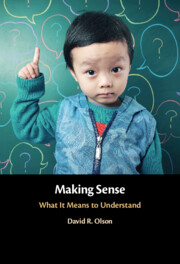Book contents
- Making Sense
- Making Sense
- Copyright page
- Dedication
- Contents
- Figures
- Tables
- Preface
- 1 An Introduction to the Puzzles of Understanding
- 2 Understanding As Feeling and As a Concept
- 3 The Linguistic Basis of Mind
- 4 Subjective Mental States
- 5 Objective Mental States
- 6 Intersubjectivity of Mental States
- 7 Identity Conditions for Feelings and Concepts
- 8 What “Understanding” Means
- 9 The Referential Scope of Understanding
- 10 Understanding and Children’s Theory of Mind
- 11 Understanding and Sense-Making
- 12 Understanding As a Learnable Skill
- 13 Understanding in Everyday Life
- 14 Ascriptivism and Cognitive Development
- References
- Index
9 - The Referential Scope of Understanding
Published online by Cambridge University Press: 21 April 2022
- Making Sense
- Making Sense
- Copyright page
- Dedication
- Contents
- Figures
- Tables
- Preface
- 1 An Introduction to the Puzzles of Understanding
- 2 Understanding As Feeling and As a Concept
- 3 The Linguistic Basis of Mind
- 4 Subjective Mental States
- 5 Objective Mental States
- 6 Intersubjectivity of Mental States
- 7 Identity Conditions for Feelings and Concepts
- 8 What “Understanding” Means
- 9 The Referential Scope of Understanding
- 10 Understanding and Children’s Theory of Mind
- 11 Understanding and Sense-Making
- 12 Understanding As a Learnable Skill
- 13 Understanding in Everyday Life
- 14 Ascriptivism and Cognitive Development
- References
- Index
Summary
It is not surprising that young children sometimes misunderstand expressions. There is a well-known children’s game called “Simon Says.” The parent or teacher gives the rule: Only do what Simon says. The adult then says, “Simon says touch your nose,” but sometimes says only “Shake your head.” Children are to comply with the first but not the second. Google provides a brief video as part of its entry for “Simon Says.” It reveals, what is often reported, three- or four-year-olds often comply with both, while slightly older children are more able to make the distinction, but all children love the game. The game is an early introduction to the rules for correct understanding. Understanding correctly is difficult because the main clause determines how the other clause is to be understood.
- Type
- Chapter
- Information
- Making SenseWhat It Means to Understand, pp. 96 - 105Publisher: Cambridge University PressPrint publication year: 2022

